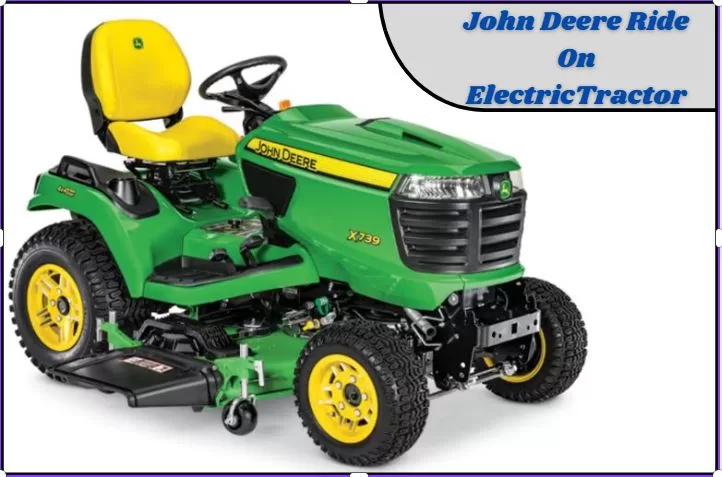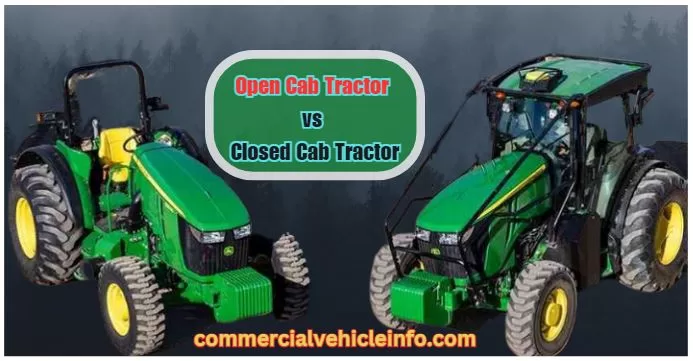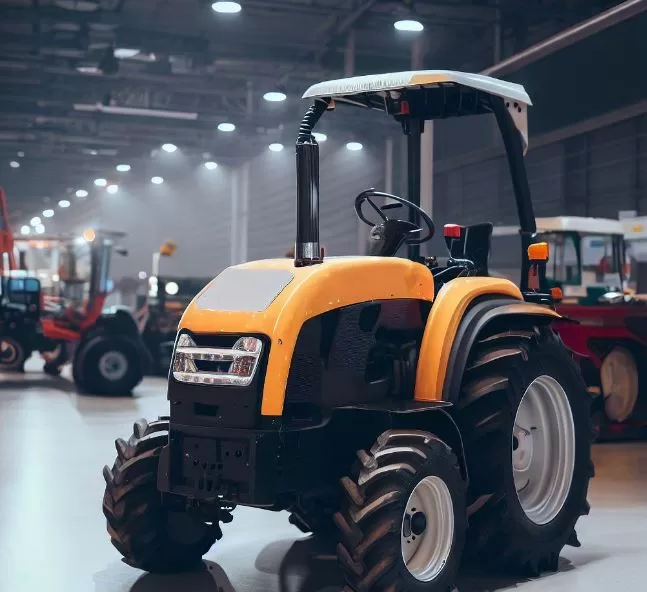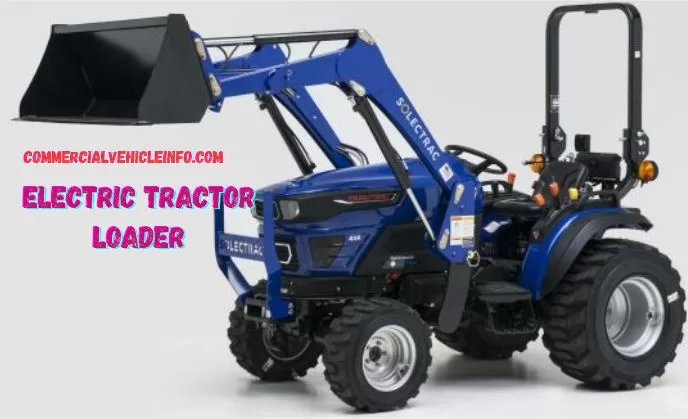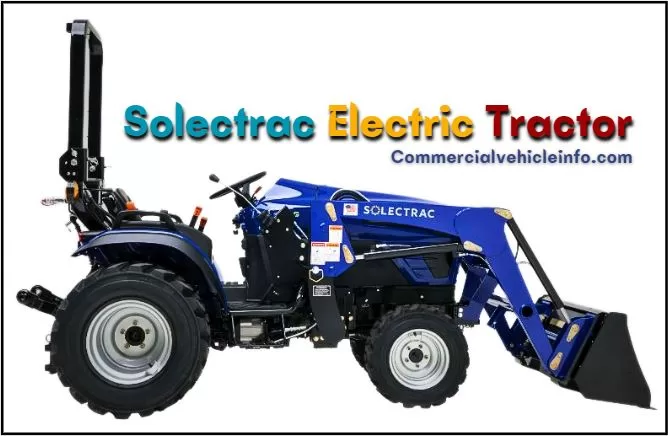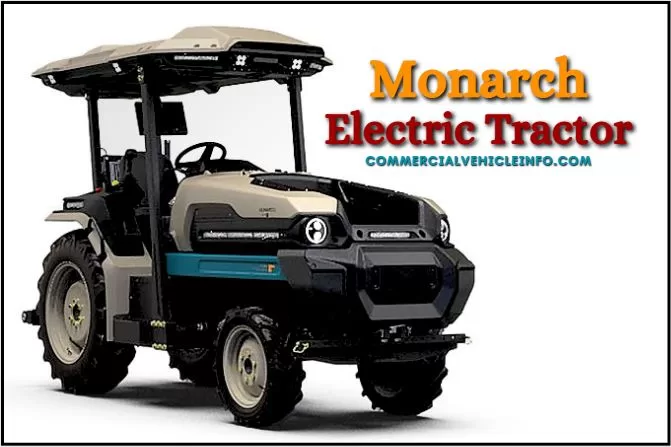Modern Electric Tractor Agriculture has been the backbone of human sustenance for centuries. However, the conventional practices of farming have taken a toll on the environment due to excessive fuel consumption and emissions.
Enter the modern electric tractor, a game-changing innovation that promises to combine the power of agriculture with the principles of sustainability.
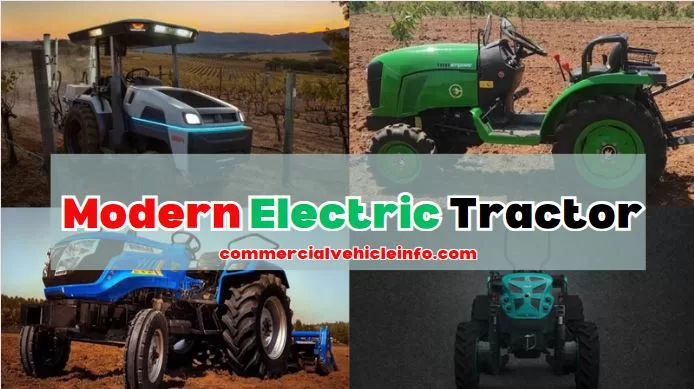
In this article, we’ll embark on a journey through the world of modern electric tractors, exploring their mechanics, advantages, challenges, and the profound impact they’re poised to make on the future of farming.
Join us as we unravel the narrative of modern electric tractors—where sustainability and productivity coexist, where the fields become a canvas for innovation, and where the seeds of change are sown for a brighter, more sustainable tomorrow.
What is Modern Electric Tractor?

An electric tractor, also known as a modern electric tractor, is a type of agricultural vehicle that is powered by electricity instead of traditional fuels like diesel or gasoline.
Electric tractors can be powered by electric vehicle batteries or connected to an electric power source through a cable.
They offer several advantages over diesel tractors, including reduced maintenance needs, cost savings on fuel, and significantly lower greenhouse gas emissions.
Electric tractors are battery-powered and minimize fuel consumption, making them an advantageous choice for agriculture.
They are long-lived and durable vehicles that are free from some of the challenges faced by electric cars.
With advancements in motor and battery technology, modern electric tractors have comparable carrying and pulling power to their gas or diesel counterparts.
Manufacturers like John Deere and Kubota have developed prototype electric tractors, including plug-in and autonomous models.
John Deere’s electric compact tractor, based on the 1R Series, offers high power take-off (PTO) capabilities and low maintenance costs. Kubota is also prototyping an autonomous electric tractor.
The future of electric tractors looks promising, with the potential for further advancements in battery technology, electric drives, and robotics integration.
Electric tractors have the potential to revolutionize farming practices by improving efficiency, reducing emissions, and enabling more precise and sustainable agricultural practices.
Best Modern Electric Tractor
Determining the best modern electric tractor requires a comprehensive evaluation of various factors such as performance, features, and customer reviews.
Monarch Tractor
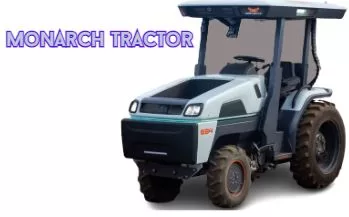
Monarch Tractor is recognized as the maker of the world’s first fully electric, driver-optional tractor.
Their electric tractor is designed to provide sustainable farming practices while maintaining economic viability. Monarch Tractor emphasizes clean, efficient, and economically viable solutions for farmers.
Solectrac Tractor
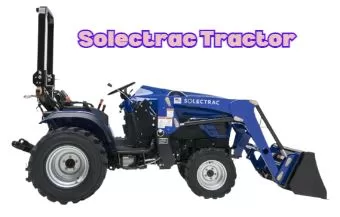 Solectrac is a leading electric tractor manufacturer in the United States.
Solectrac is a leading electric tractor manufacturer in the United States.
They focus on providing technology for zero-emission regenerative agriculture and utility operations. Solectrac offers the e25 Compact Electric Tractor, which is versatile and suitable for various applications such as hobby farms, golf courses, and municipalities.
John Deere Tractor
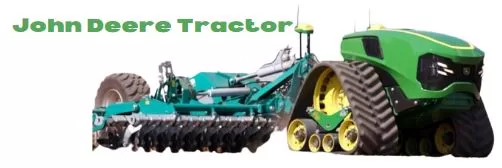
John Deere, a well-known agricultural equipment manufacturer, has also ventured into the electric tractor market.
They offer an electric compact tractor based on their 1R Series, which provides high power take-off capabilities and low maintenance costs.
John Deere is also exploring autonomous electric tractor concepts.
Importance Of Modern Electric Tractors
Modern electric tractors are becoming increasingly important in farming for a number of reasons. They offer a number of advantages over traditional diesel tractors, including:
- Lower operating costs: Electric tractors do not require gasoline or diesel fuel, which can save farmers a significant amount of money on fuel costs each year.
- Zero emissions: Electric tractors produce zero emissions, which can help to improve air quality and reduce greenhouse gas emissions.
- Quieter operation: Electric tractors are much quieter than diesel tractors, which can be an advantage in urban areas or near homes.
- Easier to maintain: Electric tractors have fewer moving parts than diesel tractors, which means they are easier to maintain. This can save farmers time and money on maintenance costs.
- Potential for self-driving: Electric tractors are more easily equipped with self-driving technology than diesel tractors. This could lead to increased efficiency and productivity in the future.
Advantages of Modern Electric Tractors
Electric tractors are becoming increasingly popular in modern farming practices due to their numerous advantages. Here are some of the key advantages of modern electric tractors:
Reduced emissions
- Electric tractors don’t release carbon emissions, making them far more environmentally friendly than traditional diesel tractors.
- They help reduce greenhouse gas emissions and contribute to a cleaner environment.
Lower energy costs
- Electric tractors are battery-powered, which means they don’t require any fuel, resulting in significant savings for farmers.
- They are more energy-efficient than traditional tractors, making them a cost-effective option for farmers.
Reduced noise pollution
- Electric tractors are much quieter than traditional tractors, which can help reduce noise pollution in farm communities.
- This makes them a more pleasant option for farmers and their neighbors.
Improved efficiency
- Electric tractors have comparable carrying and pulling power to their gas or diesel counterparts, and advancements in motor and battery technology are making them even more powerful.
- They are also easier to maintain and have a longer lifespan than traditional tractors, resulting in lower maintenance costs for farmers.
Increased safety
- Electric tractors have fewer moving parts than traditional tractors, which reduces the risk of accidents and injuries.
- They also produce less heat and vibration, making them a safer option for farmers.
Components of Modern Electric Tractors
Modern electric tractors are composed of several key components that work together to power the vehicle. Here are some of the main components of modern electric tractors:
- Battery: The battery is the primary power source for electric tractors. It stores electrical energy that is used to power the electric motor.
- Electric motor: The electric motor is responsible for converting electrical energy from the battery into mechanical energy that powers the tractor’s wheels.
- Power electronics: Power electronics are used to control the flow of electrical energy from the battery to the electric motor, ensuring that the tractor operates efficiently.
- Transmission system: The transmission system is responsible for transferring power from the electric motor to the tractor’s wheels, allowing it to move forward or backward.
- Control system: The control system is responsible for managing the tractor’s various components, including the battery, electric motor, and transmission system. It ensures that the tractor operates safely and efficiently.
Types of Modern Electric Tractors
Modern electric tractors come in different types, each with its unique features and capabilities. Here are some of the main types of modern electric tractors:
Battery electric tractors:
- Battery electric tractors are powered by batteries and do not require any fuel. They are environmentally friendly and cost-effective, making them an attractive option for farmers.
- Battery electric tractors have a limited range, but advancements in battery technology are making them more powerful and efficient.
Hybrid electric tractors:
- Hybrid electric tractors combine a battery-powered electric motor with a traditional diesel engine. They offer the benefits of both electric and diesel tractors, including reduced emissions and improved efficiency.
- Hybrid electric tractors are more expensive than battery electric tractors, but they have a longer range and can handle heavier workloads.
Plug-in hybrid electric tractors:
- Plug-in hybrid electric tractors are similar to hybrid electric tractors, but they can be charged using an external power source. They offer the benefits of both battery electric and hybrid electric tractors, including reduced emissions and improved efficiency.
- Plug-in hybrid electric tractors have a longer range than battery electric tractors and can handle heavier workloads than hybrid electric tractors.
Features of Modern Electric Tractors
Modern electric tractors come with various features that make them efficient, sustainable, and user-friendly. Here are some key features of modern electric tractors:
- Electric Motors: Modern electric tractors are equipped with electric motors that provide reliable and efficient power. These motors offer comparable carrying and pulling power to their gas or diesel counterparts.
- Rechargeable Batteries: Electric tractors utilize rechargeable batteries as their power source. These batteries store electrical energy and provide the necessary power to operate the tractor in the field.
Advancements in battery technology have led to increased battery capacity and longer operating times. - Energy Efficiency: Electric tractors are known for their energy efficiency. They convert electrical energy from the batteries into mechanical energy with minimal energy loss, resulting in improved overall efficiency.
- Reduced Emissions: One of the significant advantages of electric tractors is their reduced emissions. Unlike traditional diesel tractors, electric tractors do not release harmful exhaust emissions, contributing to a cleaner and healthier environment.
- Quiet Operation: Electric tractors operate quietly compared to their diesel counterparts. This reduced noise level is beneficial for both the operator and the surrounding community, minimizing noise pollution.
- Low Maintenance: Electric tractors generally have lower maintenance requirements compared to traditional tractors. They have fewer moving parts, reducing the need for frequent maintenance and repairs.
- Precision Agriculture Integration: Modern electric tractors can be integrated with precision agriculture technologies. This allows for precise and targeted farming practices, optimizing resource usage and improving overall productivity.
- Autonomous Capabilities: Some modern electric tractors can be equipped with autonomous technology, enabling them to operate without human intervention. This feature offers increased efficiency and reduces the need for manual labor.
- Safety Features: Electric tractors often come with advanced safety features, such as collision avoidance systems and automatic emergency braking. These features enhance operator safety and help prevent accidents.
Applications of Modern Electric Tractors
Modern electric tractors have a wide range of applications in the field of agriculture. Here are some key applications of modern electric tractors:
- Agriculture: Electric tractors are well-suited for various agricultural tasks, including plowing, tilling, planting, and harvesting crops. They provide a sustainable and efficient alternative to traditional diesel tractors.
- Horticulture: Electric tractors are ideal for horticultural practices such as maintaining orchards, vineyards, and nurseries. Their quiet operation and zero emissions make them suitable for working in sensitive environments.
- Livestock farming: Electric tractors can be used in livestock farming for tasks such as feeding animals, cleaning barns, and transporting materials. Their low noise levels and reduced emissions contribute to a more comfortable and environmentally friendly farming environment.
- Forestry: Electric tractors are increasingly being used in forestry operations for tasks such as logging, hauling timber, and maintaining forest roads. Their low emissions and quiet operation make them suitable for working in forested areas.
- Landscaping: Electric tractors are well-suited for landscaping tasks such as mowing, trimming, and maintaining parks, golf courses, and gardens. Their low noise levels and zero emissions make them ideal for working in residential and urban areas.
Challenges and Limitations of Modern Electric Tractors
Modern electric tractors offer several advantages over traditional diesel tractors, but they also face some challenges and limitations. Here are some of the main challenges and limitations of modern electric tractors:
- High initial cost: Electric tractors are generally more expensive than traditional diesel tractors due to the cost of the battery and electric motor.This can be a significant barrier to adoption for some farmers.
- Limited range: Electric tractors have a limited range compared to traditional diesel tractors. This can be a challenge for farmers who need to cover large distances or operate in remote areas.
- Lack of charging infrastructure: Electric tractors require access to charging infrastructure, which can be a challenge in some areas. The lack of charging infrastructure can limit the use of electric tractors in remote or rural areas.
- Heavy weight and size: Electric tractors are generally heavier and larger than traditional diesel tractors due to the weight of the battery and electric motor. This can make them more difficult to maneuver in tight spaces or on uneven terrain.
- Limited availability: Electric tractors are still a relatively new technology, and their availability is limited compared to traditional diesel tractors. This can make it difficult for farmers to find the right electric tractor for their needs.
Conclusion
Modern electric tractors stand as a testament to the marriage of agriculture and sustainability. Their potential to revolutionize farming practices, reduce emissions, and increase efficiency cannot be overstated. As the world seeks innovative solutions to address environmental challenges, electric tractors emerge as a beacon of hope for a greener tomorrow.
Visit our Website at Commercialvehicleinfo.com for Additional Details.
FAQs
Electric tractors offer better energy efficiency and expanded functionalities compared to traditional tractors.
They minimize fuel consumption, resulting in cost savings and reduced emissions.
Electric tractors contribute to a cleaner and more sustainable farming environment.
Yes, electric tractors are known for their durability and longevity.
They are designed to be long-lived and can withstand the challenges of agricultural work.
Electric tractors face fewer challenges than electric cars, such as limited range and charging infrastructure, due to their specific design and purpose.
Tractors are larger, heavier, and have different operational requirements compared to electric cars.
Yes, there are autonomous electric tractors being developed and implemented by manufacturers.
These tractors are designed to operate without the need for a human operator, offering increased efficiency and reduced labor requirements.
Yes, electric tractors can be outfitted with autonomous technology, allowing farmers to operate them with fewer workers or none at all.
This can lead to increased efficiency and cost savings for farmers.
The electric tractor market is expected to grow, driven by favorable policies towards electric vehicle adoption.
Ongoing technological advancements and innovations are making electric tractors more efficient, sustainable, and accessible.
Electric tractors have a limited range compared to traditional diesel tractors.
They require access to charging infrastructure, which can be a challenge in some areas.
Electric tractors are generally more expensive than traditional diesel tractors.
The main components of modern electric tractors include the battery, electric motor, power electronics, transmission system, and control system.
Additional components may include regenerative braking systems, safety features, and precision agriculture integration.
The main types of modern electric tractors include battery electric tractors, hybrid electric tractors, and plug-in hybrid electric tractors.
Each type has its unique advantages and limitations, depending on specific needs and preferences.
Electric tractors are suitable for various agricultural tasks, including plowing, tilling, planting, and harvesting crops.
They are also used in horticulture, livestock farming, forestry, and landscaping.
Electric tractors offer a sustainable and efficient alternative to traditional diesel tractors in various industries.

